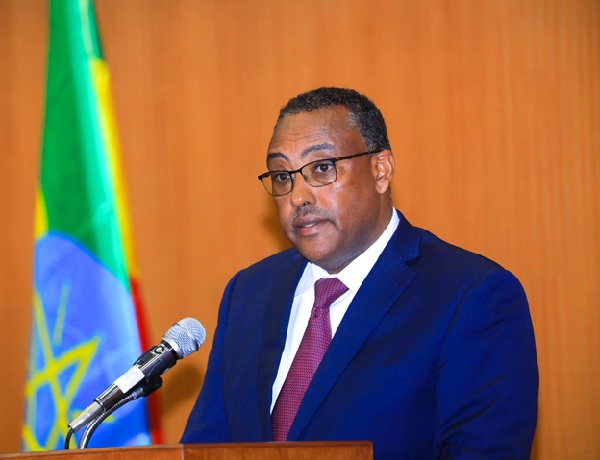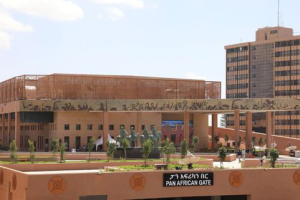
BY YOHANES JEMANEH
These days, consuming negative news about humanity and pretending like nothing went wrong has become the new normal at the global level. Unless the world gets vital means and the gut for genuine and close cooperation to redress the myriads of calamities, the current trend of reverberating the consequences of natural and manmade disasters on global news networks will never show improvement.
As it has been doing in various times, Ethiopia is still calling for the global community to join hands and strive for mutual interests to curb common threats. For instance, Ethiopia has made repeated calls for cooperation in peace and development endeavors. These calls have been not insincere pledges but rather, practically proven commitments that the country showcased to the world through playing due roles in various peacekeeping missions and environmental protection activities.
As a genuine nation that foresees the realization of a peaceful and accommodating planet, Ethiopia is making these calls and commitments to work together with the rest of the world for mutual growth. The nation reiterated this timely plea once again on September 24 at The General Debate of the 77th Session of the United Nations General Assembly held on 24 September 2022.
On the occasion, Deputy Prime Minister and Foreign Minister Demeke Mekonnen said that the world must stand in unison to realize a fair and practical global cooperation while respecting the national interest and security of every sovereign country.
The world is at a historic crossroads in the evolution of the global multilateral system. Humanity is facing multiple and complex challenges, ranging from climate change, extreme poverty, conflicts, terrorism, and geopolitical tensions, he said.
The consequences of these global challenges are of epic proportions and leave adverse socio-political impacts across the world. Nevertheless, international cooperation is not at a level near the gravity of the challenges.
“We have a shared planet and a common destiny. Overcoming our collective challenges requires concerted effort and trusted global leadership. We are gathered here because our forefathers, learning from the tragic episodes of human history, decided to establish the United Nations as the guardian of peace,” he noted.
However, Demeke believed that the world has yet not achieved true universality in the main organs of the United Nations mentioning that Africa has no permanent seat at the UN Security Council. “Our quest for African solutions to African problems is yet to be given the respect and support it deserves. We believe, these considerations underpin the credibility of the Council in the continent,” he stated.
African problems are sustainably addressed when approached in the true context of the region and take full account of the strategic interests and aspirations of the countries concerned. It is only when the world upholds regional solutions that it could start reducing the proliferation and over extended stay of African issues in the UN Security Council.
For the past four years, Ethiopia has made significant progress in its socio-economic development, and democratization. These years have also been compounded by challenges that tested our survival as a nation.
In November 2020, the most heinous and treasonous attack was waged against the Ethiopian National Defense Forces that protected not only the peace and stability of Ethiopia but also helped keep peace in other countries on behalf of the United Nations and the African Union, Demeke told the UN.
“The criminal group that remains hell-bent on destroying the societal foundation of our country colluded with external actors opposed to our development aspirations. The insecurity this group created has been very tragic and costly. Yet, the Government of Ethiopia has earnestly tried to avoid this conflict. Regrettably, our efforts to prevent the conflict from igniting were not successful,” he expressed.
“Thanks to the resolve and determination of Ethiopians, the designs of our adversaries against Ethiopia’s progress have been frustrated. We have also paved a path for peace and recovery relying on the ability of the peace-loving people of Ethiopia to reconcile, make peace among ourselves and start the process of healing. We thus call for support to our agenda for peace, reconciliation, and reconstruction. We also urge respect for and support to the AU-led peace process. Any other approach, including the politicization of human rights and unilateral coercive measures will not yield any positive outcome,” Demeke stressed.
For Demeke the last year was not only a testing time for Ethiopia since the country has witnessed the commencement of power generation of the Grand Ethiopian Renaissance Dam which fulfilled the inter-generational aspiration of the historic nation.
All the glory and gratitude go to the people of Ethiopia who financed this project. The dividend goes far and wide to the entire region, he noted adding that his country will remain dedicated for mutual benefit. “I reiterate Ethiopia’s commitment to equity and cooperation in the use of Transboundary Rivers and shared prosperity with all riparian countries. We will continue in good faith the trilateral negotiation under the auspices of the African Union to reach a mutually acceptable outcome,” Demeke emphasized.
On the other hand, the Deputy PM and Foreign Minister raised the necessity of global cooperation to achieve mutual development through realizing the Sustainable Development Goals (SDGs) that encountered serious setbacks from COVID-19 pandemic.
Global trade in goods and services was halted causing a great deal of loss to economies. The response by international financial institutions has been below the required level and did not account for the special vulnerability of least developed countries, he said.
“We call for enhanced focus and support to national efforts to improve agricultural and manufacturing productivity, increase investment, facilitate technology transfer, foster fair trade, redouble debt cancellation and restructuring, and enhance international finance for national priority projects. Furthermore, we should enhance the efforts to combat illicit financial flows, unlawful extraction and trade of minerals, and corruption,” Demeke urged.
For him, Africa’s youthful population and its vast natural resources should be a source of growth and better jobs. Africa can be the showcase for green and sustainable development. It can feed and power itself and the world.
This requires reform of the global financial architecture to ensure more equitable, speedy, and collaborative cooperation based on the needs and potential of least developed countries. According to Demeke, governments that work to create a conducive environment for the prosperity of their countries must get support from the international community. In addition, Africa’s effort to chart its destiny must not be complicated by big power competition.
“The gravity of the challenges we face today demands us to come together in search of collective solutions. We need more, not less, multilateralism. We shall continue to uphold our cardinal principles of independence, impartiality, integrity, noninterference, sovereign equality, and non-selectivity to maintain a working multilateral system rooted in the Charter of the United Nations. We need to reform our global institutions to reflect current realities. We need to make them more representative and responsive to the demands of the time. Only through genuine solidarity and concerted action could we ensure collective security and prosperity,”
Demeke also reflected Ethiopia’s commitment to strengthening its bilateral cooperation with various countries as he met with envoys of various countries and organizations including Russia, UK, Turkiye, Mozambique, UAE, EU and ICRC among others during the sideline meetings.
In the conversation with the Russian Foreign Minister Sergey Lavrov, Demeke lauded the longstanding relationships between the two sides. The two sides agreed to tighten bilateral ties with expanded engagement in various sectors and cooperate in multilateral fora, discussed the level understanding reached during Lavrov’s visit to Ethiopia and reached an agreement that the meeting of the joint commission of the two countries should be held in a short period of time.
At the sideline meeting of the UN General Assembly, Demeke also talked about bilateral and regional issues of mutual interest with UK’s Minister of State for Development, Vicky Ford, Foreign Minister of Turkiye, Mevlüt Çavuşoğlu and the Deputy Minister of Foreign Affairs and Cooperation of Mozambique, Manuel Gonçalves.
As a country that has a long history of diplomatic relations with various countries, Ethiopia is still working on achieving cooperation with the world on development and other activities of mutual concern. Therefore the genuine commitments that were reflected by the Deputy Prime Minister and FM Demeke were living testimonials of the country’s longstanding dedication to reciprocal efforts for an accommodative living environment across the globe.
The Ethiopian herald September 27/2022





